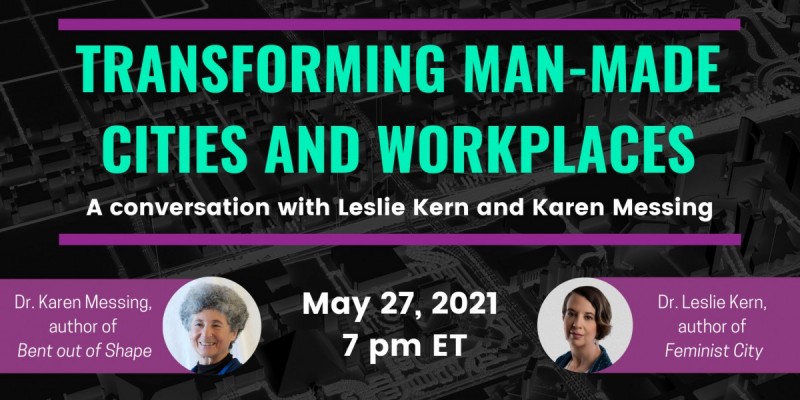Transforming Man-Made Cities and Workplaces

A conversation between feminist geographer Dr. Leslie Kern and feminist ergonomist Dr. Karen Messing.
Register here on Eventbrite
Accessibility: Auto-generated closed captions will be provided live, and the recording will be made available after on Between the Lines’ YouTube, along with the transcript. The event is free, and donations are welcomed.
Dr. Karen Messing and Dr. Leslie Kern have been looking at different contexts, yet finding remarkably similar trends.
Blue-collar workplaces, the focus of Dr. Messing’s book Bent out of Shape (Between the Lines, 2021), and urban environments, the subject of Dr. Kern’s Feminist City (Between the Lines in Canada / Verso worldwide, 2020), are largely designed by men and take into account men’s experience, to the detriment of women and non-men.
This puts women in harm’s way, at risk of strain, injury, assault, limited mobility, sexist judgement, and more. In these contexts, designed with disregard and even hostility towards women and non-men, shame is too often a response of women and non-men.
By talking with women workers, unions, and employers, award-winning feminist ergonomist Dr. Karen Messing has seen how solidarity among workers can be built to transform workplaces.
Likewise, feminist geographer Dr. Leslie Kern points us to how feminist cities can be – and indeed already are – being brought into being around the world.
Dr. Leslie Kern is an associate professor of geography and environment and director of women’s and gender studies at Mount Allison University. She is the author of Feminist City (2020), which has been translated into many languages around the world, and Sex and the Revitalized City: Gender, Condominium Development, and Urban Citizenship (2010).
Dr. Karen Messing is a professor of biology at the University of Quebec in Montreal (UQAM), where she does research in partnership with unions and women’s groups. She was trained in ergonomics and genetics. She is an internationally-known expert on occupational health from a gender perspective. Her 2014 Pain and Prejudice: What Science Can Learn about Work from the People Who Do It was translated into French, Korean and German. She has won numerous academic and non-academic awards.
